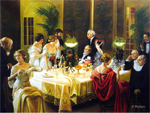
To the Lighthouse
"The war, people said, had revived their interest in poetry" (134).
Points of Reflection
"Time Passes"
- at what point in this chapter did you begin to become anxious for the well-being of the remaining characters?
- is Nature "red in tooth and claw" in this section of the novel, or a friend to man?
- does solitude appear to provide a salve for the ills of life (132-34)?
- does section VII concern Nature generally, or something more specific?
- distinguish between Lily Briscoe's and Mr. Carmichael's separate responses to returning to the Ramsays' beach house.
- reexamine Mr. Bankes's private, prognosticatory names for the Ramsay kids (21-22). Do these names accurately assess and predict the course of any of these various individuals' lives?
- why might Woolf introduce character deaths in brackets?
- is Mrs. McNab literally witless (130 top)?
- which of the Ramsays' children die in this section, and why is this important?
- does this chapter's implicit attitude towards change echo that of Mrs. Ramsay (111 bot, 113 top) in the previous section?
- how do the events of this section alter our re-reading of Mr. Ramsay's optimism about friends' and family members' interconnectedness after death (113 mid - 114 top)?
- return again to chapter thirteen of "The Window." What function does the skull in the children's bedroom serve (114), and is Mrs. Ramsay’s covering it with a shawl pregnant with symbolism?
- in “Time Passes,” does darkness carry with it a purely positive or purely negative valence?
- what answer does “Time Passes” provide to the narrator’s question, “Did Nature supplement what man advanced? Did she complete what he began?” (134 top).
- how does Woolf go about evoking WWI? Besides quick references to one of the Ramsay boy’s deaths and the poetry of Mr. Carmichael, how does she signal global violence without painting it in gory hues?
- is death a malevolent presence in Woolf’s novel?
- does today’s reading add anything substantive to the novel’s treatment of religion?

The End of Dinner (1913)
Jules Alexandre Grun
Dr. Paul Marchbanks
pmarchba@calpoly.edu
![]()
